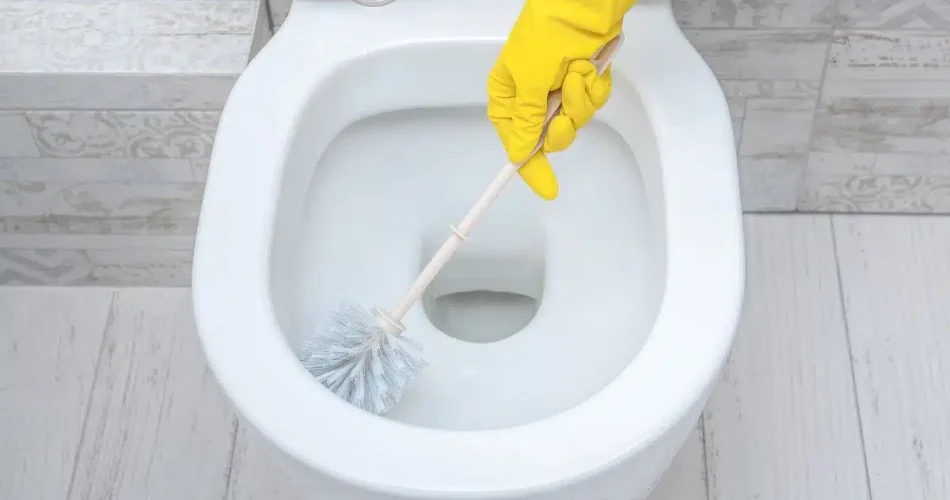Maintaining clean toilets can be a challenging task, especially when it comes to tackling limescale buildup. These stubborn white deposits, which form due to hard water, can quickly become unsightly and pose potential health risks. Fortunately, there are natural, effective solutions that not only remove limescale but do so without the unpleasant odors often associated with traditional cleaning products. One such product is citric acid, a lesser-known yet powerful alternative to white vinegar.
Why Is Limescale a Problem?
Limescale is the result of hard water, which contains high levels of minerals like calcium and magnesium. Over time, these minerals accumulate in areas with frequent water use, such as toilet bowls, leading to the formation of hard, chalky deposits. These limescale deposits are more than just an aesthetic issue:
- Unsightly Appearance: Limescale buildup leaves visible white stains in the toilet, which can make even the cleanest bathrooms look dirty.
- Clogged Pipes: Over time, limescale can accumulate in pipes, leading to blockages and reduced water flow.
- Health Concerns: Limescale provides a breeding ground for harmful bacteria, increasing the risk of hygiene-related health issues.
Common Solutions: Pros and Cons
For years, white vinegar has been the go-to natural solution for removing limescale. Its acidity helps break down the mineral deposits, making it easier to scrub them away. However, while vinegar is effective, it comes with some drawbacks:
- Strong Smell: The overpowering odor of vinegar can linger in the bathroom long after the cleaning is done, making it unpleasant for many users.
- Repeated Use of Harsh Chemicals: Some people turn to commercial chemical products, which are effective but often harmful to health and the environment.
Citric Acid: A Better Natural Alternative
Citric acid is an excellent, eco-friendly alternative to both vinegar and harsh chemicals. It is a weak organic acid naturally found in citrus fruits, and it is commonly used in the food and cosmetic industries for its preservative and cleaning properties. Despite being less well-known than vinegar for household cleaning, citric acid offers numerous advantages:
- Highly Effective: Citric acid is powerful enough to dissolve limescale efficiently.
- Odor-Free: Unlike vinegar, citric acid leaves behind no unpleasant odors—instead, it has a mild, lemony scent.
- Non-Toxic and Environmentally Friendly: Citric acid is a natural substance that is safe to use in the home and poses no threat to the environment. It also breaks down easily, reducing the risk of water pollution.
How to Use Citric Acid for Limescale Removal
One of the great advantages of citric acid is its ease of use. Here’s a simple step-by-step guide to removing limescale from your toilet using citric acid:
Materials Needed:
- Citric acid powder
- Warm water
- A toilet brush
- A bucket or container
Step 1: Prepare the Citric Acid Solution
In a container, mix an appropriate amount of citric acid powder with warm water. The warm water helps dissolve the citric acid more effectively and enhances its cleaning power.
Step 2: Prepare the Toilet Bowl
Before applying the solution, empty as much water from the toilet bowl as possible. This ensures that the citric acid can directly contact the limescale deposits without being diluted.
Step 3: Apply the Solution
Pour the citric acid solution into the toilet bowl, making sure to cover all areas affected by limescale. Be sure to apply it around the rim and in any crevices where limescale tends to accumulate.
Step 4: Let It Sit
For mild limescale, allow the solution to sit for about 30 minutes. For more stubborn deposits, letting it sit overnight will yield the best results.
Step 5: Scrub and Flush
After the waiting period, use a toilet brush to gently scrub away the limescale. The citric acid will have weakened the deposits, making them easier to remove. Finally, flush the toilet to wash away the remaining residue.
Citric Acid vs. Other Cleaning Solutions
When compared to other limescale removal options, citric acid stands out for several reasons:
- Commercial Chemicals: Store-bought chemicals can be very effective, but they often contain harmful substances that pose risks to both health and the environment. Prolonged use of these products can also contribute to water pollution.
- White Vinegar: While vinegar is a natural solution, its strong odor can be a major drawback. Citric acid, on the other hand, is both odorless and equally effective, making it a more user-friendly option.
Other Uses of Citric Acid Around the House
Beyond being a highly effective toilet cleaner, citric acid can be used in various parts of the home for other cleaning tasks:
- Descaling Coffee Makers and Kettles: Citric acid can be used to remove limescale buildup in appliances like coffee makers and kettles, ensuring they work efficiently and last longer.
- Cleaning Stainless Steel: Citric acid is effective at removing water spots and stains from stainless steel surfaces without causing damage.
- Food Preservation: Citric acid is commonly used in cooking and food preservation, making it a versatile household product.
Practical Tips for Maximizing Citric Acid’s Effectiveness
To get the most out of citric acid when cleaning limescale, consider the following tips:
- Dilute Properly: Always dilute citric acid with water before use, as it is a concentrated substance that could cause damage if used undiluted.
- Test First: Before applying citric acid to large or visible areas, perform a small test on an inconspicuous spot to ensure there’s no adverse reaction.
- Rinse Thoroughly: After using citric acid, always rinse the treated area well to remove any leftover residue.
Conclusion: A Cleaner and Greener Approach to Toilet Maintenance
Citric acid is an excellent alternative to both harsh chemicals and white vinegar for removing limescale from toilets. Its powerful cleaning properties, coupled with its environmentally friendly and odor-free nature, make it a must-have in any home. Not only is citric acid effective, but it also promotes a greener, healthier approach to household cleaning.
By incorporating citric acid into your cleaning routine, you can keep your toilets sparkling clean, free from limescale, and hygienic—without resorting to harsh chemicals or enduring unpleasant smells. Try this simple yet effective trick, and you’ll soon see the benefits of using citric acid for toilet maintenance and beyond.



